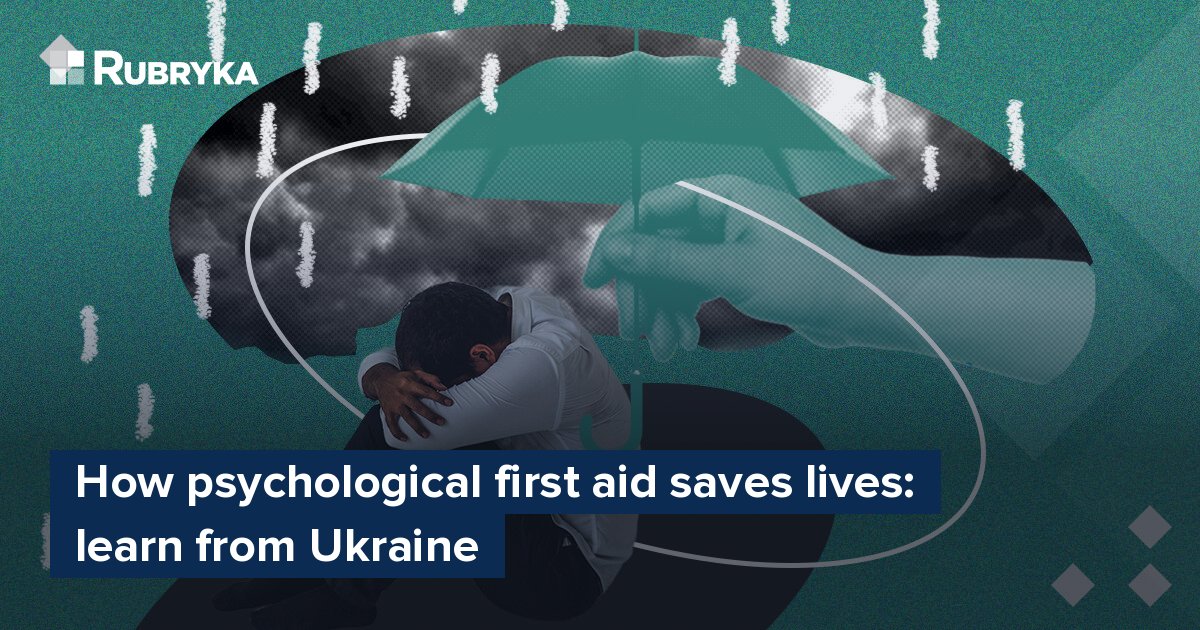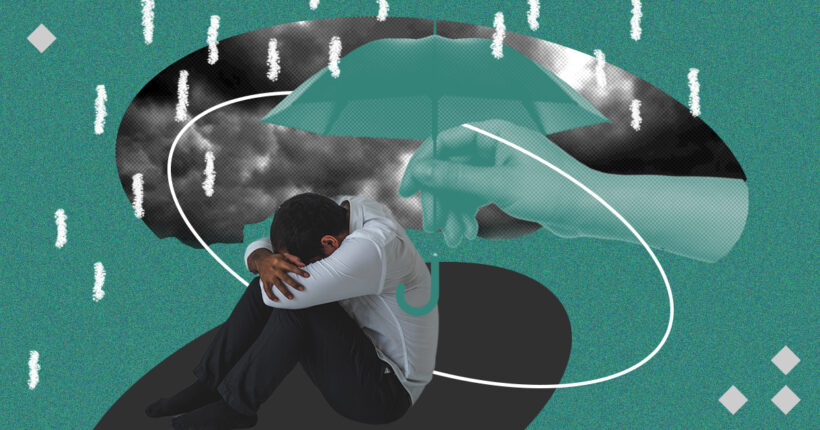
What's the problem?
The war has changed the reality for every Ukrainian. Stress, shock, panic, aggression — these are things Ukrainians see daily, even in those who are trying to stay strong.
The most vulnerable are those who go through extreme situations: shelling of residential buildings, injuries, the loss of loved ones, and violence. These are the moments where the psychological first aid can make a difference.
This isn't treatment or long-term therapy — it's a way to stabilize a person's condition in the moment of stress, prevent their mental state from aggravating, and help them face their difficult emotions with someone as opposed to alone.
What's the solution?
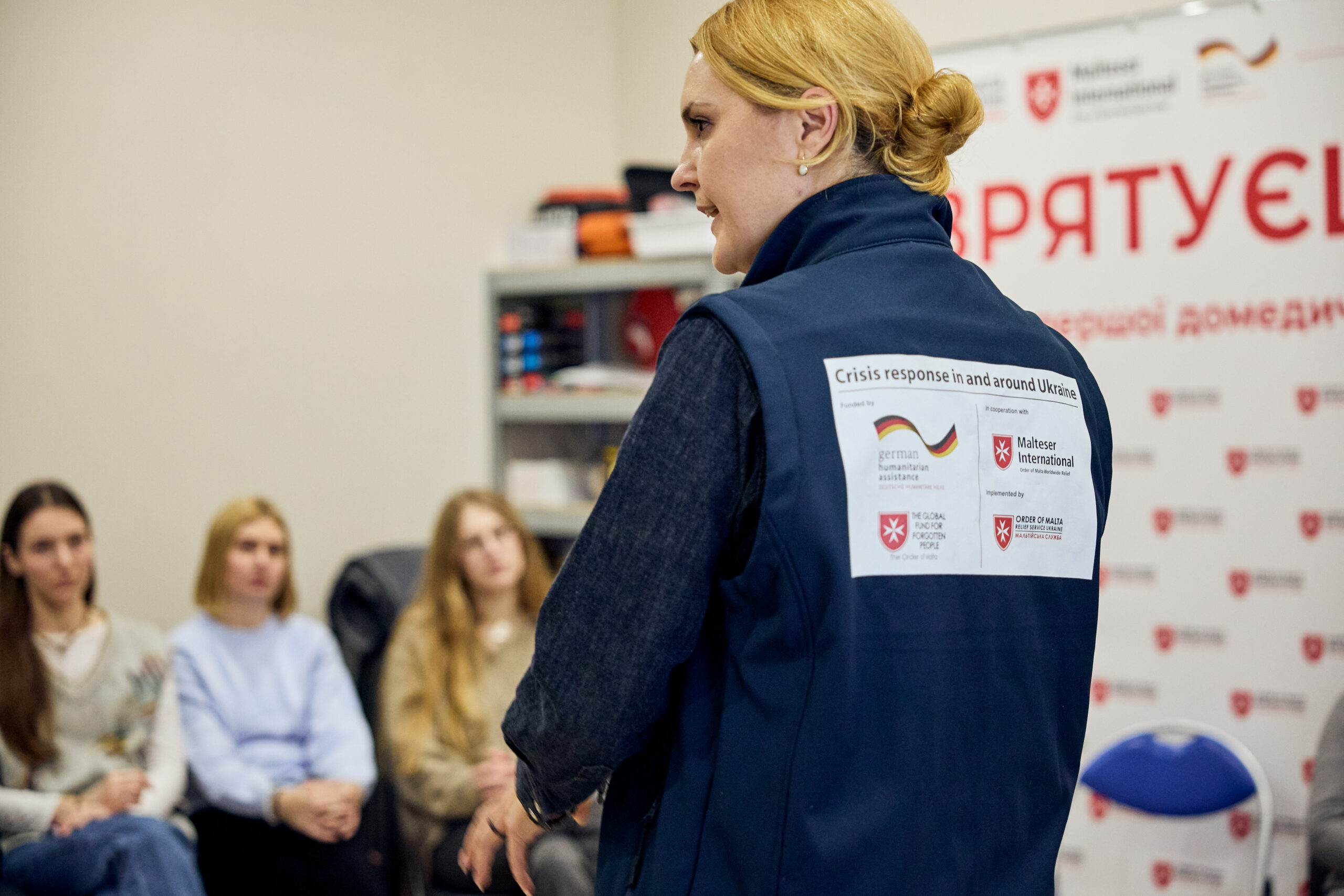
Photo: Malteser Relief Service
Malteser Relief Service, an international humanitarian charity working with displaced Ukrainians, offers first aid courses to civilians to prepare them for emergencies, which has become daily in Ukraine.
Olena Abramuk and Viktoria Sokil, psychologists from the Psychological Support Center of the Malteser Relief Service, believe that psychological first aid (PFA) is as essential as traditional medical first aid, so they teach basic PFA skills to the Ukrainian public. Recently, they conducted a training session for journalists, volunteers, and specialists in the field.
In this article, Rubryka collected key advice Malteser Relief Service psychologists teach to Ukrainian civilians. You can apply it to emergencies in your life, too.
How does it work?
Initial reaction: shock and disorientation
A person might be in shock in the first few minutes after a traumatic event due to a sudden surge of adrenaline and cortisol. This can temporarily distort their perception of reality — they may not fully grasp what's happening, their reactions might be either slow or chaotic, and their ability to think logically and make decisions may be impaired. The main goal is to avoid adding more stress and help their body gradually transition into a more stable state.
Olena Abramuk, a psychologist at the Psychological Support Center of the Malteser Relief Service, explains:
"We deal with extreme events, and the key question is: how does ordinary stress differ from extreme stress? Typically, the first stage is shock. A person may not immediately comprehend what has happened. It's essential to provide psychological and physiological support without pressuring them to talk about their experience."
What to do? Speak calmly and steadily, and use simple, understandable phrases. Avoid asking complex or leading questions, and don't ask for explanations or memories of the traumatic event. Don't touch the person to avoid causing extra tension. Create a safe space: move away from the danger zone, offer them a seat if possible, and observe their physical condition. Help normalize their breathing by breathing slowly together. Most importantly, let the person feel they are not alone and that their reaction is a normal response to an extreme situation.
Aggression and panic: how to respond
Aggression is one of the most common reactions to a crisis. It can manifest through a raised voice, sudden movements, or even attempts at physical violence. It's important to understand that aggression isn't about malice — it's a defensive mechanism.
Viktoria Sokil, a Malteser psychologist, says:
"We work with different people: internally displaced persons, those who've lost loved ones, children who've witnessed violence. Despite all the challenges, supporting the person here and now is the most important thing. This gives them confidence in tomorrow."
What to do? Reduce the number of people around; move to a safer place if possible. Speak calmly and evenly — don't argue or try to convince them of anything. Allow them to release tension through movement or sound. You can suggest a physical action, such as tearing a piece of paper or squeezing an object. If aggression escalates, keep a safe distance and assess potential risks to yourself and others. If the situation becomes dangerous, notify the appropriate authorities. The key is not to respond to aggression with aggression. Staying calm will help the person gradually regain control.
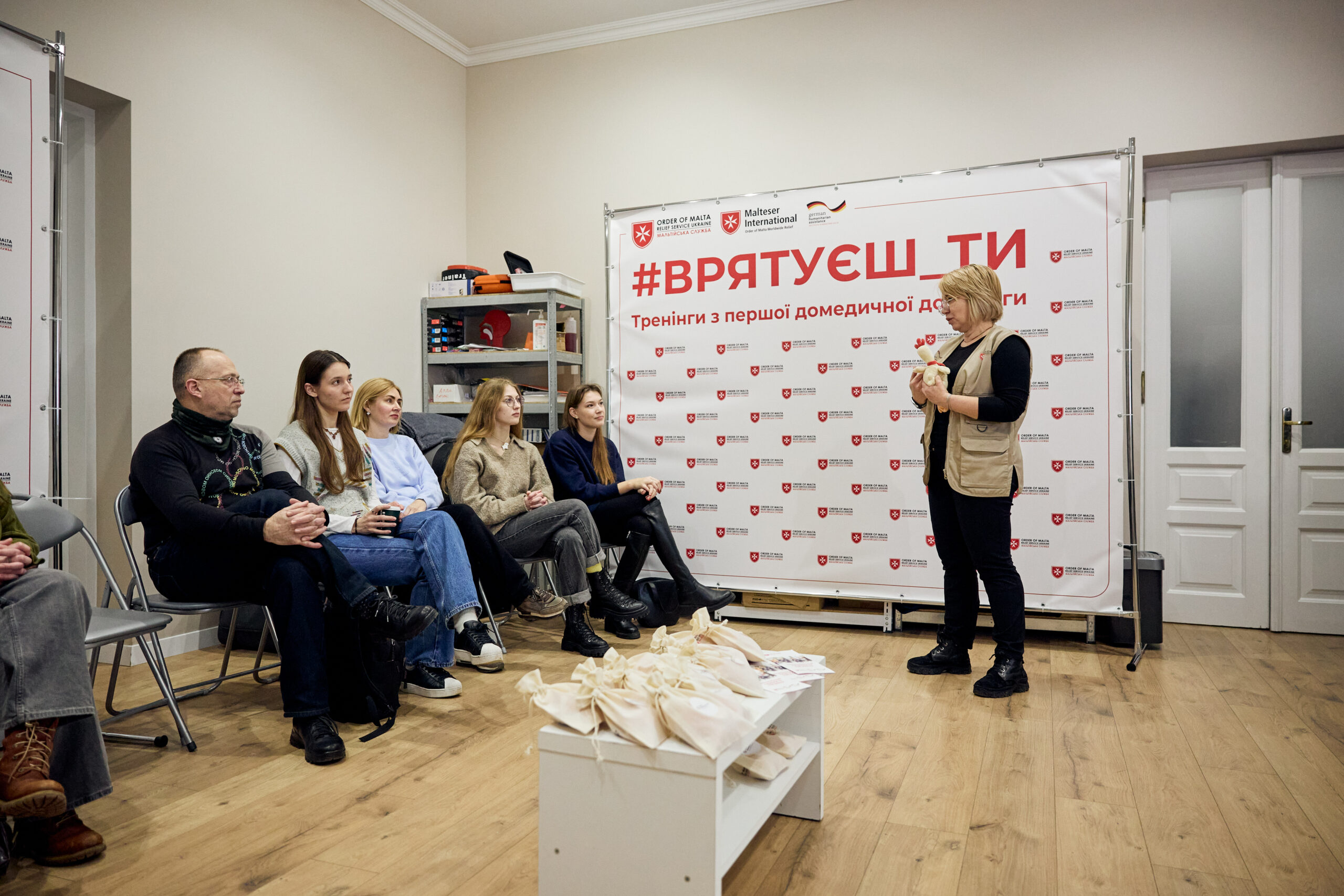
Photo: Malteser Relief Service
Trembling and freezing up
Some people experience intense trembling after an initial shock. This is a normal physiological reaction — the body's way of regaining control. The important thing is not to suppress it.
What to do? Lightly hold their shoulders and gently shake them while explaining your actions. Encourage them to sit down if possible or move to a safer location. If they start dissociating or losing touch with reality, prompt them to perform simple actions — ask them to say their name or describe objects around them. Avoid sudden movements or touching them without permission.
If they become completely unresponsive, try to re-engage them by holding their hand, gently massaging pressure points on their forehead, or using reassuring phrases like, "I'm here," "You're not alone."
Hysteria and crying
A hysterical reaction is the psyche's way of releasing overwhelming tension. A person might scream, sob uncontrollably, or speak incoherently.
What to do? Ensure a calm environment and remove unnecessary spectators. Use an unexpected action to shift their focus — drop an object that makes a loud noise, for example. Give clear, short instructions: "Drink some water," "Sit down," and "Breathe slowly."
Psychological first aid is more than just words
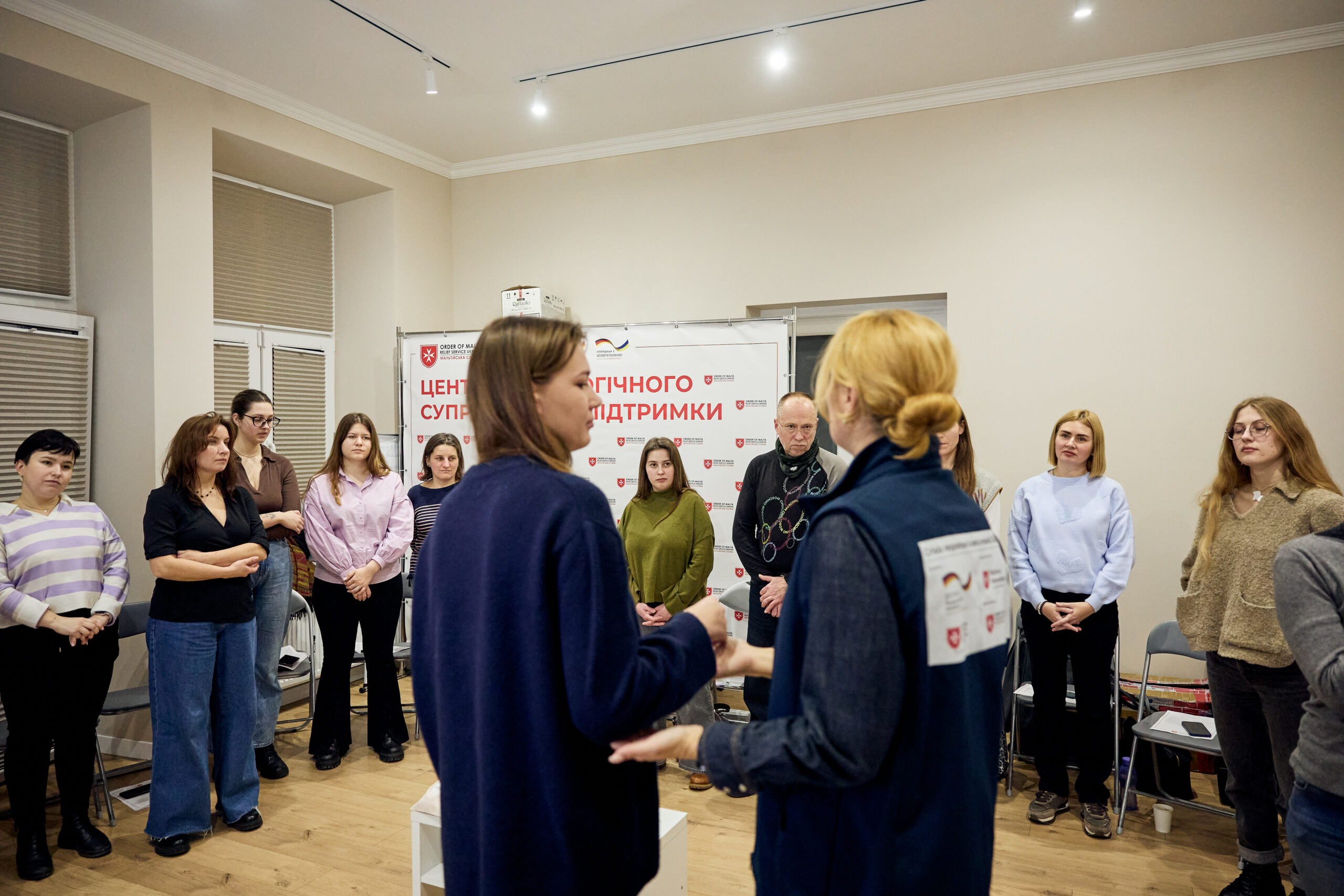
Photo: Malteser Relief Service
"We don't have a one-size-fits-all solution, but we are here to help people find their footing and move forward," says Olena Abamiuk. "When someone is in crisis, they don't just need support — they need a sense of safety and stability. Psychological first aid isn't always about talking. Sometimes, it's about silence, presence, or simply holding someone's hand."
She continues, "We can't always prevent traumatic events, but we can ensure a person isn't left alone with their pain — that's where healing begins. It's important not to pressure them, not to demand explanations, and not to say 'calm down' or 'stop crying.' Just be there — calm and reassuring as much as possible — and let them know: 'I'm here. You're not alone.'"
Psychological first aid is the first step toward recovery. It can save not just mental well-being but lives.
About Malteser Relief Service's Psychological Support Center
The Malteser Relief Service's Psychological Support Center has been helping war-affected Ukrainians since 2014. Over the years, it has conducted thousands of sessions for those needing psychological support. Since 2022, the team has grown to include over 50 specialists — psychologists, psychotherapists, social workers, and supervisors — providing crisis assistance.
The center offers:
- Individual consultations: crisis support, help with stress and anxiety.
- Group activities: stress-management training, grief coping sessions, art therapy (drawing, music therapy, workshops), support groups, and psychoeducational workshops.
- Rapid response teams: assistance for victims of attacks, crisis counseling, psychological first aid.
- Community cohesion programs: support for displaced persons, community integration, cultural and recreational events.
If you're in Ukraine and need help, you can call their local centers:
Lviv: +38 (097) 739 69 02
Kharkiv: +38 (063) 138 84 70
Sambir: +38 (063) 138 80 49
Zolochiv: +38 (063) 138 83 98
Author: Liubov Kurtiak


